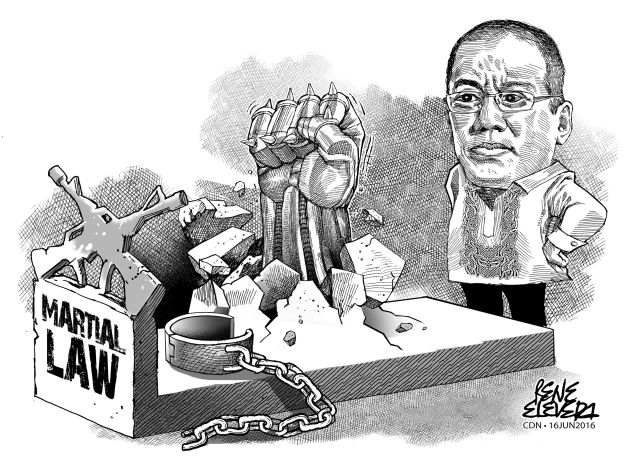
President Benigno Aquino III’s final Independence Day speech may draw derision, an angry outburst or a tempered response from his successor, President-elect Rodrigo Duterte, but it still bears watching a few weeks from now when Aquino steps down from office.
That he timed it on Independence Day made it significant even if the impact was lost after his anointed successor failed to convince the majority of the Filipinos about the righteousness and the success of the “Daang Matuwid” (straight path) agenda.
Despite Duterte being quoted as describing himself as a “dictator” Mr. Aquino’s warning failed to sway the 16 million who voted the Davao City mayor to the country’s highest post based on his 20-something years of ruling that city with an iron fist.
The stories about the Davao Death Squad and the summary killings of suspected drug dealers and criminals didn’t deter the populace from voting for Duterte. In fact these were what drew them to him in the first place after having had their fill of lousy service, the turtle-like pace of rehabilitation and repair of devastated towns and cities, the monster traffic jams and the growing gap between rich and poor.
In warning against the resurgence of a dictatorship, Mr. Aquino rehashed anew that cliched quote: “The only thing necessary for evil to triumph is for good men to do nothing.” The outgoing President answered his own warning and also gave the reason why his anointed successor failed in his bid to continue his “Daang Matuwid” governance.
It is said that crisis situations bring out either the best or the worst in every leader, and President Aquino and his anointed successor had not met the challenge posed by either the Yolanda devastation or the Mamasapano massacre decisively.
Duterte managed to convince the populace that he represented change and adopted that mantra of change in his eventually successful campaign. But as rights advocates and others still suspicious about his agenda would ask: At what cost would this change entail?
The warning signs are already there: Duterte warning Congress “not to get in his way” in his three-to-six-month campaign against crime, and his attack on the country’s media industry which he accused of being corrupt and arrogant when it questioned his policy on the unsolved murders of media practitioners.
With his dismal handling of crisis situations and even mid-level problems like traffic congestion, Mr. Aquino’s warning about a looming dictatorship has fallen mostly on deaf ears, to be remembered only by his loyal lieutenants and those who still consider his presidency as better than his unlamented predecessor.
He could have quoted the late US president Franklin Delano Roosevelt, the longest serving leader in that country’s history, who said the reason why democracy failed is not because the people found despots and ideologies like communism and socialism to be better but because they grew tired of the failures of democratically elected governments to provide and care for them.
History will tell whether President Aquino was either right about his warning or whether he contributed to democracy’s collapse by his own administration’s failure to uplift the lives of the Filipino people.